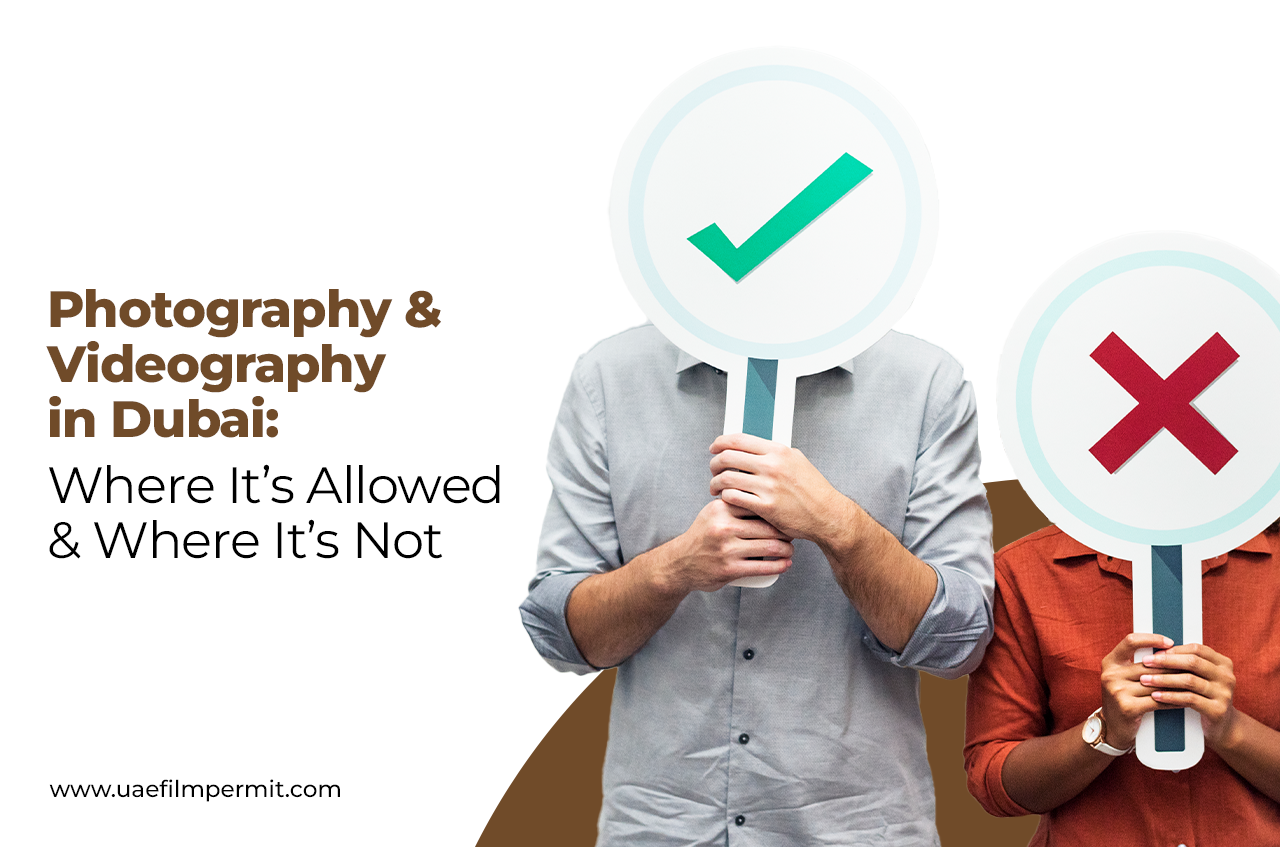Dubai has emerged as a global hub for content creators, filmmakers, photographers, and social media influencers. From futuristic skylines and luxury shopping centers to deserts and beaches, the city offers an expansive visual canvas. Nevertheless, understanding Dubai’s specific rules for photography and videography is essential before pressing the record button.
Whether you’re a tourist hoping to capture travel memories, a filmmaker planning a documentary, or a business seeking visual content for marketing, knowing where photography and videography are allowed, and where they are not, is critical. This blog aims to offer clear and detailed guidance for individuals and businesses alike, especially when considering the need for a photography permit or videography permit in Dubai.
Dubai maintains a structured approach to protect privacy, cultural values, and ensure public safety. As such, while there is ample opportunity for creative expression, it is balanced by legal frameworks and permit requirements. Understanding these laws will ensure your shoot remains lawful and hassle-free.
Why Rules Exist for Photography and Videography in Dubai
Dubai’s regulations around photography and videography are not arbitrary. They exist to safeguard several foundational elements of the city’s ethos:
- Protection of Privacy: Many residents value their personal privacy. Capturing individuals without their consent, especially women and families, can lead to legal complaints.
- Cultural Values: Dubai is deeply rooted in Islamic traditions. Filming in certain locations or during religious practices can be considered disrespectful without proper approval.
- National Security: Photography around government buildings, airports, and other strategic locations is controlled to prevent any misuse of visual data.
- Avoiding Public Disturbance: Large film crews or commercial shoots can disrupt public spaces. Permits help the city maintain order and avoid traffic or crowding issues.
Government authorities like the Dubai Municipality and Dubai Film and TV Commission oversee and enforce these regulations. Their role ensures that all filming activity aligns with the laws of the land while still enabling creative work to flourish under the right permissions, such as a dubai photography permit or dubai videography permit.
Where Photography and Videography Are Allowed (No Permit Needed)
Not all areas in Dubai require a permit. If you’re using handheld devices for personal use, you can often shoot freely in several locations.
- Public Tourist Spots: Areas like Burj Khalifa vicinity, JBR Walk, Dubai Marina, and public desert safari tours typically allow casual photography and videography without permits.
- Parks and Beaches: Locations like Kite Beach and Al Barsha Pond Park permit casual use of cameras. However, drones and large equipment are not allowed unless you have the necessary clearances.
- Hotels and Resorts: Guests may take photos within their rooms or resort premises, but it is advisable to ask for permission before shooting in shared or lobby areas.
- Malls and Restaurants: For non-commercial use such as taking selfies or quick personal videos, most locations allow filming. However, bringing professional gear can lead to security intervention.
These locations provide a great opportunity for content creators. But if your content is commercial or intended for professional use, a photography permit is required, even in these publicly accessible zones.
Where Photography and Videography Are Not Allowed (Or Require Permission)
Certain places in Dubai are either restricted entirely or require a formal process for gaining permission:
- Government and Military Buildings: Any attempt to photograph these areas can lead to serious legal consequences, including arrest or deportation.
- Airports and Public Transport: Filming in airports, metro stations, and buses is generally prohibited unless special permission is obtained.
- Religious Sites: Mosques and other religious institutions prohibit photography and videography unless a specific cultural or journalistic project has obtained prior clearance.
- Commercial Shoots in Malls or Properties: You must obtain explicit approval from the property management. Even influencer shoots using DSLRs or gimbals can be flagged.
- Drone Usage: The UAE General Civil Aviation Authority (GCAA) controls drone usage. Flying drones for videography or photography without a license is strictly prohibited.
When any of the above applies, you will need a Dubai photography permit or a Dubai videography permit. It’s best to plan ahead to avoid unnecessary legal complications.
Situations Requiring Official Filming Permits
Permits become essential in specific professional and commercial scenarios. If your shoot goes beyond casual personal content, you will need to apply through the Dubai Film and TV Commission (DFTC). Here are common cases where permits are mandatory:
- Commercial Shoots: Advertising campaigns, influencer collaborations, and sponsored content require permits regardless of location.
- TV Productions and Documentaries: These involve scripting, talent, and production teams. You must apply for permits outlining location,detes, and objectives.
- Corporate Videos: Videos made for marketing or internal communication in outdoor or semi-public locations must follow the legal route.
Applying for a photography permit or videography permit via DFTC website includes submitting an application form, proof of insurance, location details, and a timeline. Once approved, you will receive a formal permit that must be presented on-site during the shoot.
Best Practices for Responsible Shooting in Dubai
To remain compliant while enjoying your shoot, consider these best practices:
- Seek Permission in Private Areas: Always ask hotel or mall management before setting up any shoot.
- Content is Key: Avoid filming people without their explicit permission, especially families or individuals in traditional attire.
- Avoid Professional Equipment in Public Areas: Use of tripods, reflectors, lighting gear, or large cameras might classify your activity as commercial.
- Cultural Sensitivity: Do not photograph during religious rituals or inside prayer halls unless you have legal permission.
Being respectful and cautious helps you avoid legal trouble and ensures your shoot doesn’t disrupt others.
Tips from Local Content Creators & Production Experts
Dubai-based content creators and production managers recommend the following:
- Work with Local Fixers or Permit Consultants: These professionals have strong connections with authorities and location managers. They understand the nuances of securing the right permissions quickly and can save you time and risk.
- Shoot Early in the Morning or During Weekdays: Light conditions are better in the morning and you avoid peak crowds. Many influencers prefer filming just after sunrise when locations are emptier, security is more relaxed, and temperatures are cooler.
- Minimise Your Equipment Footprint: Local creators emphasise the benefit of working light. Use mirrorless cameras instead of bulky DSLRs, avoid setting up lighting rigs, unless you have permits, and try handheld shooting methods.
- Always carry Digital Copies of Your Permit: If stopped by security or local authorities, showing a digital copy of your Dubai photography permit or videography permit on your phone helps avoid unnecessary delays or confrontations. Back it up on cloud services for access across devices.
- Know Your Location in Advance: Scout your locations or ask locals about filming restrictions. Some public beaches may seem open but could be under private development or near restricted zones.
- Keep a Low Profile in Public Spaces: Even with a permit, drawing attention with large crews or noisy equipment can attract complaints or raise red flags. Work respectfully and maintain discretion.
Legal Consequences of Violating Media Laws in Dubai
Ignoring Dubai’s media laws can have serious implications:
- Fines and Equipment Confiscation: Unauthorised shoots can lead to significant fines, and authorities may seize your gear.
- Deportation: Non-compliance, especially in sensitive areas, can result in deportation for foreign nationals.
- Content Removal: Authorities may demand deletion of footage and may ban accounts or content on social platforms.
- Production Delays: Brands or media houses can face shooting delays or even project shutdowns due to legal barriers.
Having a valid photography permit or videography permit minimises these risks and shows you are committed to legal and respectful content creation.
Conclusion
Dubai is a visually dynamic city with endless opportunities for content creators, but it’s also a place that values structure, privacy, and cultural respect. Whether you’re snapping a quick shot at the Marina or planning a full-scale commercial shoot, understanding the rules is vital.
Always be aware of where you’re shooting. If there’s even the slightest chance your content could be considered commercial, apply for the appropriate photography or videography permit. By doing so, you follow the law and also earn the trust of the authorities and the public.
Need help with permits or professional video production in Dubai? Reach out to our team at UAE Film Permit for a free consultation and expert support tailored to your needs.




